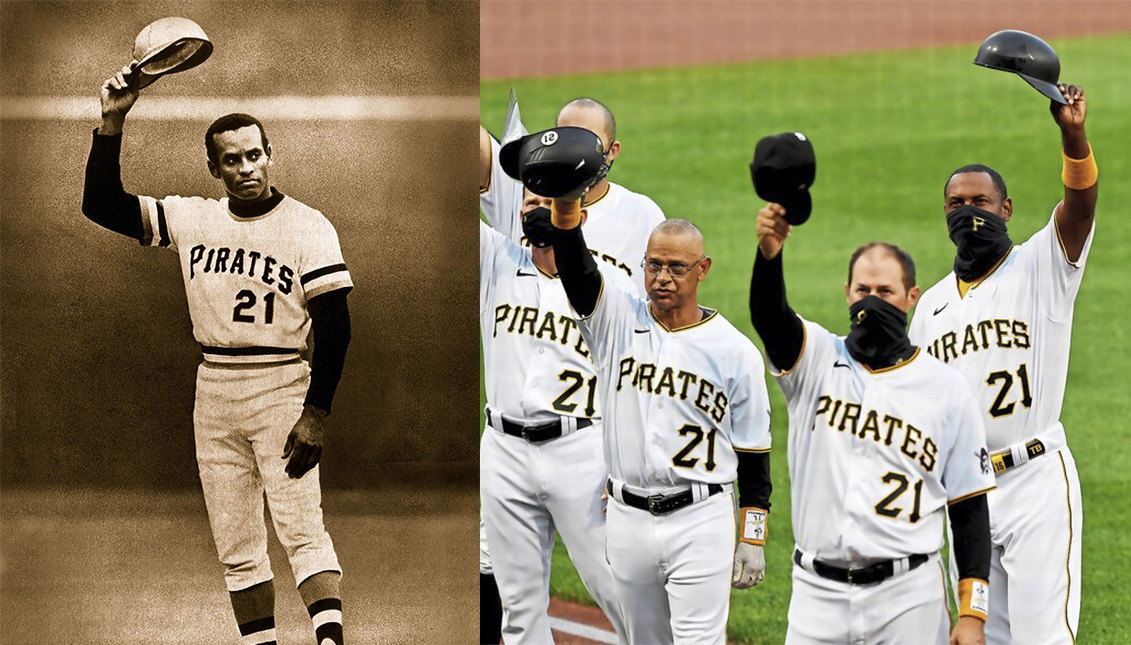
BLM in sports: Roberto Clemente's legacy today is more important than ever
The iconic "21" of the Pittsburgh Pirates was a fighter on and off the field. Today, many Black and Latino athletes are raising their voices against racism in…
For numerologists, "21" means "changes" and "new beginnings." For Pittsburgh residents, baseball fans and athletes, especially those from the BIPOC communities, the number on the back of a T-shirt symbolizes the imprint Roberto Clemente left on and off the field.
The commemorations of his death, celebrated on Tuesday — Roberto Clemente Day — and Wednesday were the most emotional in years with all the members of the Pittsburgh Pirates wearing the "21" on their backs. There is even talk of removing the number so his memory will remain celebrated as such every day of the year, as was done with Jackie Robinson's "42" in 1997.
Clemente was not only known for his iron arm and big hits — he had a .317 batting average — but as an Afro-Latino in the Major Leagues, he fought to defend the rights of Black and Brown people, both on the field and in the streets.
When he died in a tragic plane crash in 1972, Clemente was transporting humanitarian aid to earthquake victims in Nicaragua. His plane crashed off the coast of his native Puerto Rico.
Now it's common to see neighbors come out to their lawns wearing their number "21" T-shirts. The same goes for those in the bleachers every time the Pirates come out to play. It also adorns the wall in right field at PNC Park that bears his name. But players wearing the number in honor it nowadays, while historic, is not surprising. Especially as sportsmen have always played a big role in lobbying against the prevailing racism. It's an integral part of the legacy of people like Roberto, who during the 60s and 70s used their visibility to fight against racial injustices.
Clemente had to face discrimination from Jim Crow as a player during spring training in Florida while with the Pirates. He also stood up to the harsh reception he received in Pennsylvania, and even, as Ed Morales recalled for CNN, in his last interview, in 1972, he admitted to being discriminated against in a New York furniture store because of his skin color.
"He described how he fought against the indignity faced by Black players, such as when he refused to have food brought to him on the team bus because he and his other Black teammates could not dine with their white counterparts in segregated restaurants," Morales recalled.
RELATED CONTENT
For the historian Adrián Burgos Jr, a specialist in the history of minorities in sports and professor at the University of Illinois, we are witnessing an unprecedented moment in sports, since in protests like the one that took place in the 1968 Olympics in Mexico for the boycott of Black athletes, the majority of the participants were "amateur athletes." In 2020, the demands of Black Lives Matter have taken over the professional leagues like the NBA, where 80% of the players are African-Americans, or the WNBA, with Black female athletes at the forefront of the struggle.
"I'm surprised that Major League Baseball games have been postponed," Burgos said, referring to MLB's long history of being linked to the nation's morale since about World War II, when Roosevelt decided that the game should not be stopped because of the fighting.
The halt had already occurred in 1968, when after the assassination of Martin Luther King, Clemente and his teammates refused to play until after the funerals and even wrote a public statement showing their respect for Dr. King.
After George Floyd's death, the players took the lead and really saw the power they possessed by stopping the game.
"There is an urgency in the protest actions that athletes have taken this season. We are in the midst of a pandemic that has disproportionately affected the African American and Latino communities," Burgos said.
"African Americans, no matter how much they earn in sports, do not have the capacity to eliminate their Blackness. Being Black in America is their lived reality. A large part of what New York Mets player Dominic Smith or Los Angeles Clippers coach Doc Rivers seeks in sharing his experience is for people to literally see their Blackness and their humanity. They want others to not only see a Black athlete or coach whose value is in the entertainment they provide, but to see them as whole beings who are neighbors, family members and fellow Americans," he concluded.











LEAVE A COMMENT:
Join the discussion! Leave a comment.